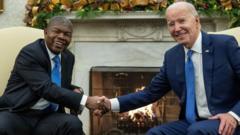**As President Biden embarks on his historic visit to Angola, his administration aims to strengthen bilateral relations and provide a counterbalance to China's growing influence through initiatives like the Lobito Corridor.**
**Biden’s Landmark Visit to Angola: A Strategic Counter to Chinese Influence**

**Biden’s Landmark Visit to Angola: A Strategic Counter to Chinese Influence**
**US President Joe Biden's inaugural journey to Africa signals a shift towards enhanced trade and investment in an effort to rival China's extensive infrastructure projects on the continent.**
US President Joe Biden's long-awaited first visit to Africa marks a pivotal effort to redefine US-African relations and confront China's significant presence on the continent. Angola, an oil-rich nation transitioning from a pro-China stance to closer cooperation with the US, serves as the focal point of Biden’s diplomatic initiative. This landmark visit underscores not only a blossoming partnership between Washington and Luanda but also America’s attempt to rejuvenate trade and infrastructure investments in Africa.
Biden’s presence in Angola, notably the first by a sitting US president, highlights the recent shift in the country's foreign policy under President João Lourenço, who has navigated away from ideological alignments with China and Russia since taking power in 2017. This reorientation towards pragmatic relations is viewed favorably by analysts, with Alex Vines of Chatham House remarking on Angola's transformation into a non-aligned player in international politics.
A central element of Biden's agenda during this visit is the Lobito Corridor, a 1,344 kilometer railway aimed at connecting rich mineral deposits in the Democratic Republic of Congo and Zambia to the Atlantic port city of Lobito. The corridor is expected to facilitate the transport of vital minerals such as cobalt and lithium, essential components for electric vehicle batteries, further asserting the US's commitment to economic engagement in Africa.
The Lobito Corridor project, co-supported by the US and other G7 nations, involves an ambitious investment totaling $600 billion through 2027, positioning it as a strategic countermeasure to China's Belt and Road Initiative. As Biden seeks to bolster US standing in Angola, the future of this project, however, remains uncertain under potential leadership changes, with former President Donald Trump signaling a return to office that could redefine US foreign policy in Africa.
Further illustrating the complexities of international relationships, Angolan President Lourenço expressed optimism that the momentum built during Biden's tenure would carry through to future administrations. He echoes sentiments that Africa seeks to engage with any powers willing to invest fairly in its development.
Despite potential setbacks in processing local materials, experts like Anthony Carroll remain hopeful about the Lobito Corridor's viability, citing enduring global demand for copper. The feasibility of transporting considerable amounts of minerals from central Africa is expected to sustain the economic significance of the corridor.
Biden's visit comes at a time when Angola is striving to reshape its international image following years of civil conflict and resource exploitation. By presenting Angola as a secure and reliable investment destination, Biden aims to attract global business interest and establish a precedent for future cooperation.
The Lobito Corridor is only the initial phase of enhancing infrastructure across the continent. Following upgrades to existing railway systems, plans for the second phase of construction aim to connect major trade routes from the Atlantic to the Indian Ocean, further solidifying trade opportunities.
In summary, President Biden's visit to Angola is a crucial step in reinforcing the US's position in African economic development through strategic partnerships, all while balancing the undeniable influence of China in the region. The initiative not only aims to create a legacy for Biden but also to ensure that US interests are safeguarded amid the shifting power dynamics of global trade.






















